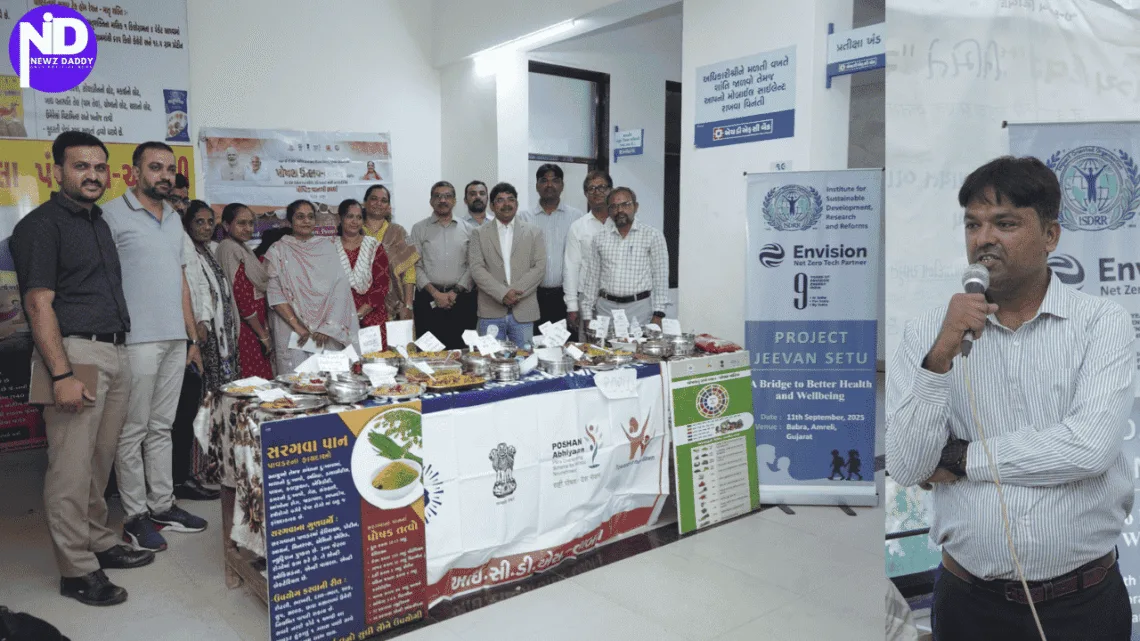Community Health And Nutrition Gains With Anganwadi Centres Drive
Newzdaddy Health And Fitness Updates
Research shows that in Gujarat, many children under age 5 suffer from malnutrition. A recent study of Anganwadi centres in Gujarat found that nearly 15% of children were underweight (moderate + severe), and supplementary nutrition (SN) programmes cover around 66% of children. Still, many Anganwadi centres report interruptions in supply and shortages of food, kitchen facilities and storage. These facts suggest that focused nutrition programs like Project Jeevan Setu could make a big difference by improving the supply and quality of nutrition. Initiative.
launched in collaboration with the District Administration, Amreli. When the district admin participates in health & nutrition programs, implementation tends to be better. In similar schemes under ICDS (Integrated Child Development Services), collaboration with local government improves reach for maternal & child health, growth monitoring and immunisation. Local governments also help mobilise resources and ensure accountability.
Adoption of 50 Anganwadi centres across Gujarat to strengthen early childhood care. Earlier evaluations of Anganwadi centres in Gujarat showed that many centres lack full preschool education (PSE) services: in some studies, only around 14-20% of centres provided full PSE to children. Also, some Anganwadi centres have issues like missing kitchen facilities,a shortage in supplementary nutrition supply, poor storage, and a lack of separate toilets. Strengthening early childhood care means addressing those infrastructure gaps.
The Institute for Sustainable Development, Research and Reforms (ISDRR), in partnership with Envision Energy India and the District Administration, Amreli, inaugurated Project Jeevan Setu: A Bridge to Better Health and Wellbeing at the Taluka Panchayat premises in Babra, Amreli.
The program is designed to improve Health, Nutrition, Education, Sanitation, and Community Empowerment across Babra block and surrounding areas, in close collaboration with ICDS, Health, Education, and Panchayati Raj departments. The special drive is aligned with “8th Rashtriya Poshan Maah 2025”, a nationwide initiative dedicated to combating malnutrition and promoting holistic child health and nutrition. ICDS is India’s long-term scheme to give children supplements, preschool education, immunisation, health check-ups, and referrals. It tries to break the cycle of malnutrition, illness, lower learning, and death. Poshan Maah is a yearly event to raise awareness, measures, and screening for malnutrition, etc. Combining local programs with national ones can help achieve a faster impact.
Key initiatives of Project Jeevan Setu include:
Early Childhood Care & Education (ECCE) programs at Anganwadi centres. Research shows ECCE (or preschool education) helps children develop better from ages 3 to 6. In Gujarat, many Anganwadis still have low preschool participation. When time tables, play materials, and trained teachers/workers are present, children do better.
School health and hygiene campaigns to instil lifelong healthy habits. Studies indicate that hygiene interventions (handwashing, school toilets, clean drinking water) reduce child illness like diarrhoea and improve attendance. Early habits tend to last. Combining health with hygiene is efficient.
Anaemia prevention through nutrition education and iron-folic acid supplementation. Anaemia among children, pregnant and lactating mothers is high in many parts of Gujarat. ICDS reports show many mothers and adolescent girls avail services, but anaemia remains a problem due to iron-folic acid gaps, diet, and parasitic infections.
Special women’s health camps with screenings for hypertension, diabetes, breast cancer, and cervical cancer
In rural areas, health camps have been effective in catching non-communicable diseases early. For women, breast & cervical cancer screening is underused. Bringing camps closer helps overcome distance, cost, and awareness barriers.
Encourage balanced diets through local food-based exhibitions. Local food exhibitions can show what foods are good locally, affordable, and seasonal. Studies show people eat better when they know how to combine local foods, not only expensive or imported ones.
Active community participation in sanitation and cleanliness initiatives. Open defecation, poor waste disposal, and lack of clean water are still issues in many rural blocks. Community involvement other than government involvement improves ownership of sanitation efforts, cleanliness drives, and helps maintain public toilets, clean surroundings.
Speaking at the launch, representatives from Envision Energy India reaffirmed the company’s CSR commitment: “At Envision Energy, we are deeply committed to empowering communities and improving quality of life through sustainable interventions in education, environment, health, nutrition, and sanitation. Project Jeevan Setu exemplifies our belief that true progress is always driven by community,” said John Shelton, CFO & Head – CSR.
Envision Energy India is marking nine years of operations in India and announced the adoption of 99 Anganwadi centres across Gujarat and Madhya Pradesh under Project Jeevan Setu. This initiative is part of its wider CSR framework, which spans Education & Skill Development, Health, Nutrition & Sanitation, Environment, and Heritage Preservation, alongside its mission to support industrial decarbonization and India’s Net Zero goals.
Envision Energy India is part of the global Envision Energy group, which works in wind, energy storage, green hydrogen, etc., contributing to clean energy. Their CSR and sustainability efforts are aligned with their core business values.
The launch event included a Nutrition Gallery Walk highlighting locally prepared healthy foods, recognition of women leaders in nutrition, and addresses by local government representatives emphasising the importance of collective action in improving community health outcomes. In past evaluations of ICDS programs, recognition of local leaders, community participation and awareness events have been shown to improve trust, attendance at Anganwadi centres, and uptake of supplementary nutrition programs.
Must Read:
SOCIAL Big Drop serves breakfast, ramen, chaats and midnight burgers with flair.






